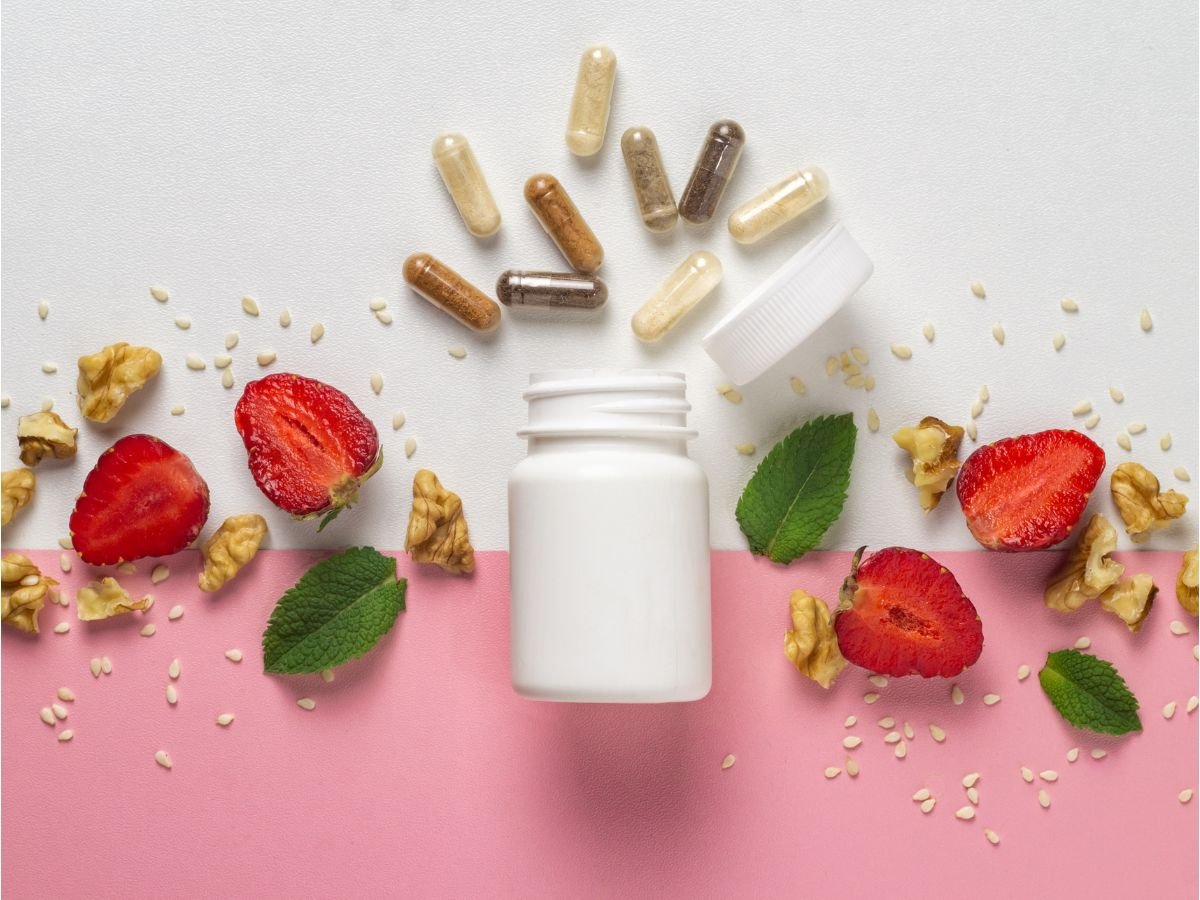What's the Best Prenatal for PCOS Fertility? 3 Powerful Tips
Are you trying to get pregnant and are you asking yourself, what's the best prenatal for PCOS?
You are in the right place.
But hold up!
Before we start about talking about how to choose a prenatal we need to talk about why a prenatal vitamin is even important before getting pregnant.
Here's the thing, prenatal vitamins are not just for pregnancy! They are an important part of pre-conception health as well.
Taking a prenatal vitamin before getting pregnant is helpful in two ways. Number one, it helps increase levels of specific vitamins needed for conception.
And number two, taking a prenatal proactively helps lower the risk of pregnancy complications once you do get pregnant.
Before I dive into these tips for the best prenatal vitamin, if you need more information about PCOS and infertility including what it is and how it's diagnosed and treated, head over to my Ultimate PCOS Fertility Guide here.
Use these tips to help figure out which prenatal is best for PCOS. As always, include your doctor in this discussion, and ask them what's best for you.
Oh, and be sure to read to the end. I've also got one bonus hot tip for you.
3 Powerful Tips for Finding the Best Prenatal Vitamin for PCOS
Best Prenatal for PCOS Tip #1: Buy From a Good Quality Source
Not all prenatal vitamins are created equal. And, unfortunately, looking at the label doesn't give you the full information.
Here's what I mean.
Quality control is lacking with supplements. The supplement industry is huge, estimated at almost 400 billion market size in 2022. So if you're wondering if you are in a small group taking supplements, you're not! You are in the company of many.
Quality control has not been keeping up with this huge growth in supplements.
Supplement companies are regulated by the FDA, but many new supplements are released without the FDA even knowing about it, which the FDA states directly on their website. Also, the FDA isn't cracking down on companies making them show what kind of quality is inside the supplement bottles.
This is what quality control means for your fertility health
There may be different levels of a certain vitamin inside the capsule then what is listed on the label. This is problematic because some supplements have interactions with medications which make it dangerous to take together.
There may be toxic fillers inside the capsules. A build-up of toxins can lead to unwanted hormone imbalance and lowered fertility.
Poor-quality supplements don't only affect your health, they also affect your wallet. If you want to invest in supplements, then make sure to buy products that contain what they say they have.
When you are ready to buy a prenatal, here are three tips for finding high-quality supplements:
Use supplements from companies that exclusively sell to healthcare practitioners. The best way to do this is talk with your provider about what brands they stand behind.
Call the supplement company directly to ask them if they do 3-party testing and what type of quality-control is performed.
Look for the USP label. USP, or the U.S. Pharmacopeia, has designed a set of strict criteria that supplement companies must follow in order to have the USP label. Not all companies are required to prove their quality-control which is why this label is a good thing to look for when browsing for supplements. With the USP label, you know that you're buying from a company that only includes levels of nutrients that are listed on the bottle, doesn't have toxic fillers, and will break down in the body in a reasonable amount of time.
When figuring out the best prenatal for PCOS, quality needs to be at the top of the list.
Best Prenatal for PCOS Tip #2: Check the "Other Ingredients" List
You've now narrowed your search down a little. You know you need to either buy a prenatal from a healthcare provider, or look for a USP label that ensures quality-control. What's the next thing to check out?
Look at the "Other Ingredients" portion of the prenatal label.
Here's how to do that:
Look at the back of the prenatal vitamin bottle
Look for the list of nutrient levels. This is the part of the label that lists each vitamin followed by the amount of each vitamin that is included.
Look at the bottom of that label, you should see a list of "other ingredients"
A common ingredient that's added is sugar. But beware, it may not be listed directly as "sugar". It may be disguised as an ingredient like "glucose syrup".
One popular prenatal vitamin brand contains 4 grams of sugar. This is equivalent to one teaspoon of sugar, that's not an insignificant amount!
One of the most common reasons ovulation doesn't happen with PCOS is because of elevated insulin, or blood sugar levels, in the body. Don't let sneaky levels of sugar in the prenatal vitamin contribute to your ovulation issues.
If you're looking for the best prenatal for PCOS, skip the ones with added sugar.
Best Prenatal for PCOS Tip #3: Check for Methylated Vitamins
Methylated vitamins are vitamins that are more easily absorbed and used by the body. Their counterparts, are the synthetic versions. Synthetic versions of vitamins don't act as efficiently in the body. Unfortunately, they are still common in prenatal vitamins.
When looking for the best prenatal for PCOS, look for methylated folate and vitamin B12. Let's talk more about what that means.
What's the big deal about methylation?
There are two different forms of the vitamin folate. One is the synthetic form, the other is the natural form. The synthetic form of folate is folic acid. The natural form is folate.
There are also two different forms of vitamin B12. The synthetic form is cyanocobalamin and the natural form is methylcobalamin.
Both folate and vitamin B12 help lower homocysteine levels in the body. Researchers have found that higher homocysteine in follicular fluid is associated with lower rates of pregnancy.
In short? Lower homocysteine = better fertility
When someone takes folic acid, the body has to turn that into the natural form of folate.
The MTHFR gene is what turns folic acid into folate. But if you are one of the 30-60% of people who have a defect in the MTHFR gene, that process doesn't happen like it needs to.
The synthetic form of vitamin B12 (cobalamin) also needs to be converted into the natural form (methylcobalamin) in the body. This process can also be affected by the MTHFR gene.
Taking the active forms of both folate and vitamin B12 help the body use those vitamins more efficiently. This helps lower homocysteine which improves egg quality and pregnancy rates.
So to add to the fertility equation from above: Better absorbed folate and vitamin B12 = lower homocysteine = better fertility
How to check for methylated or synthetic vitamins
Flip that prenatal to the back and look through the ingredients list. Usually folate and vitamin B12 are towards the top of the list.
Synthetic folate will be listed as folic acid. Methylated folate will be written using the term MTHF.
Synthetic vitamin B12 will be listed as cyanocobalamin and the methylated version will be listed as methylcobalamin.
The higher quality prenatal vitamins will have folate listed as folate-MTHF (or a variant of that), and vitamin B12 listed as methylcobalamin.
If you're looking for the best prenatal for PCOS, you now know three important tips for figuring it out. But there's one more thing I want to you to be sure you know about prenatal vitamins, and it's this hot tip I've got for you.
Hot Tip! What Prenatal Vitamins are Missing
You may see prenatal vitamins that contain vitamin D and/or DHA. You may have also heard how important these two nutrients are for PCOS fertility. I haven't mentioned making sure these are included in the prenatal vitamin, so now you want to know if it's important to have in your prenatal.
Here's my answer:
Yes, it's true that both vitamin D and DHA support optimal PCOS fertility health. So much so that they are a part of my Fertility Foundations Protocol. BUT, when prenatal vitamins contain these two nutrients, they usually have a very low amount that doesn't do much.
When it comes to vitamin D, research finds that doses between 1,000 to 10,000 IU's helps improve fertility rates. Prenatal vitamins typically have about 400 IU's. That's a big difference.
When it comes to DHA in prenatal vitamins, I usually see about 300-400mg of DHA per dose. This is too small of an amount. DHA must come from the diet and Western diets are low in DHA. It's estimated that people eat up to 10 times the lower amount of DHA!
Here's how low DHA affects fertility: Omega-3 fatty acids are important to help lower inflammation and improve egg quality. And in order to compensate for a diet low in DHA, a higher dose needs to be used.
My tip for you? Take vitamin D and DHA separately because the effective dose is higher than what these prenatal vitamins provide.
There are a lot of great options for prenatal vitamins. Thorne Basic Prenatal is one that my patients and I love. If you need a good quality prenatal, you may want to consider this one. You can click the image below to be re-directed to the Thorne website and get 10% off your order.
Please note this is an affiliate link and I will receive a small commission if you choose to order through this discount link.
In Summary
When you're looking for the best prenatal for PCOS, these are the top 3 things to look for:
Find it from a good quality source
Skip the sugar
Look for the active, "methylated" forms of folate and vitamin B12
And the one hot tip for you! Prenatal vitamins don't (usually) contain the necessary levels of vitamin D and DHA.
Figuring out the best prenatal for PCOS is just one piece of the puzzle.
Are you tired of trying to figure out what your body needs to get pregnant with PCOS?
Take away the guess-work by signing up here for a FREE PCOS Fertility Breakthrough Session.
During your free session, you will discover:
How to turn around your PCOS frustrations to be closer to reaching your fertility goals.
Why what you’ve been doing is leading you away from optimal fertility and what actually works.
What’s been missing from your care that’s keeping you from seeing results.
Clear step-by-step guidance to have your best chance at becoming pregnant.
Don't wait, sign up here today
If you LOVED this article, here’s where you need to head next:
Ultimate Guide to PCOS Fertility: What You Need to Know
Learn the Top 5 Best Supplements for PCOS Fertility
How to Improve Your Chances of Getting Pregnant with PCOS
Articles used to research this article:
Homocysteine and follicular fluid





